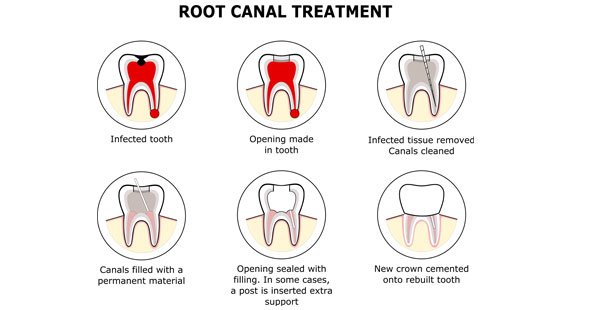Root Canal Therapy
A root canal is performed when the soft inner part of a tooth, known as the pulp, is injured or becomes inflamed or infected.

Your dentist will assess the likelihood of success before performing root canal therapy, usually by viewing an x-ray of the tooth.
Root Canal Treatment is when the damaged tooth pulp is removed. The pulp space is then cleaned and disinfected and the space is filled with a root canal filling.
Treatment is always performed under local anaesthetic, via a small injection to the gum, to ensure the procedure is pain free.
We would always recommend saving a tooth where possible rather than extracting. It makes sense to keep our natural teeth for as long as possible.

Endodontic treatment treats the chamber inside of the tooth. It is commonly known as Root canal treatment.
Inside a tooth, beneath the hard enamel and dentine, is a soft tissue called the pulp within a chamber extending the full length of the roots. The pulp contains blood vessels, nerves, and connective tissue.
Endodontic treatment is necessary when the pulp becomes inflamed or infected. This may occur due to a deep cavity, repeated dental treatment or a cracked tooth from trauma. If the inflammation or infection is left it may cause pain or an abscess.
Often a patient will present with acute pain from a tooth including prolonged sensitivity to a hot or cold stimulus and the problematic tooth tender when chewing or to touch. In severe cases there may also be a swelling around the tooth. However sometimes there are no symptoms.
Root canal treatment aims to remove the inflamed or infected pulp by carefully cleaning and shaping the inner chamber and roots. The root space created is then filled and sealed and a bonded restoration or crown is then placed to prevent reinfection.
The aim of an endodontic procedure is to relieve pain. With modern anaesthetics and techniques the procedure should be relatively painless. You should feel no more than when having a filling placed.
Following treatment mild discomfort may be experienced but this is usually managed well with non-prescriptions analgesics and anti-inflammatories. However, if you have severe pain or pressure lasting more than a few days, call the practice for further advice.
Typically we are able to perform treatment in one appointment but occasionally a second visit may be required.
The tooth is first examined clinically in the mouth and by x-ray. Local anaesthetic is then provided to ensure the tooth is numb. A rubber sheet is placed over the tooth to isolate it and make the treatment more comfortable without having to swallow any materials or water during treatment.
2. An opening in the centre of the tooth is made and very small instruments are used to clean the chamber and root canals and to shape the space for filling.
3. The root canals are then filled with a biocompatible material, usually a rubber-like material called gutta-percha with a paste sealant. In most cases, a permanent filling is then placed to close the opening.
4. An x-ray picture is taken to confirm the complete root system has been correctly filled. A year follow up x-ray is often also required to confirm a successful outcome to treatment.
5. A crown or other bonded restoration is then usually indicated to protect and restore the tooth to its full function.
If the tooth lacks sufficient structure to hold the restoration a post may be placed inside the tooth.
When performed to a high standard Endodontic treatment has a very high success rate. Many root canal-treated teeth will last a lifetime with proper after care. Following treatment regular daily care to maintain a healthy mouth and ensure longevity of any dental work should be maintained including regular oral health checks.
Most endodontically treated teeth can last as long as other natural teeth. However In a few cases, a tooth that has undergone endodontic treatment may not heal or symptoms may continue.
Occasionally, there may be a return of symptoms months or even years after successful treatment. When this occurs redoing the endodontic procedure can often be done.
The majority of teeth are suitable to be treated. On occasions the root canals system is not accessible however this is rare especially when using a Dental microscope to aid visualisation.
If a tooth does not have sufficient structure left to be restored, has a fracture to its root systems or insufficient bone support then a root treatment may not be suitable and alternative treatment options may be more advisable.
Implants:
Research has proven that endodontic treatment and dental implants are equally successful. Therefore, it makes sense to start by trying to save your natural tooth – nothing looks, feels or functions like it. If, for whatever reason, healing does not occur, then treatment with a dental implant is an excellent backup plan.

The Village Dental Practice is a family dentist based in Whickham, Newcastle Upon Tyne, offering both NHS and Private Dental treatments.
Riverdale TradeCo Ltd trading as Village Dental Practice is a credit broker, authorised and regulated by the Financial Conduct Authority. Registered in England & Wales 11506562
Where required by law, loans will be regulated by the Financial Conduct Authority and the Consumer Credit Act. Credit is provided by Wesleyan Bank Limited who is authorised by the Prudential Regulation Authority and regulated by the Financial Conduct Authority and the Prudential Regulation Authority. Wesleyan Bank Ltd (Registered in England and Wales No 2839202) Registered Office: PO Box 3420, Colmore Circus, Birmingham B4 6AE. Tel: 0800 358 1122. www.wesleyanbank.co.uk Terms and conditions apply.
